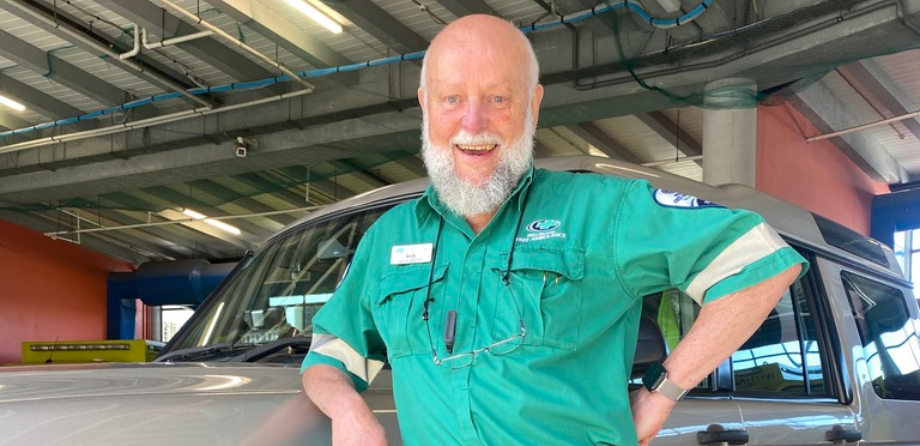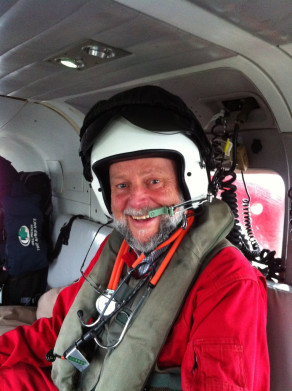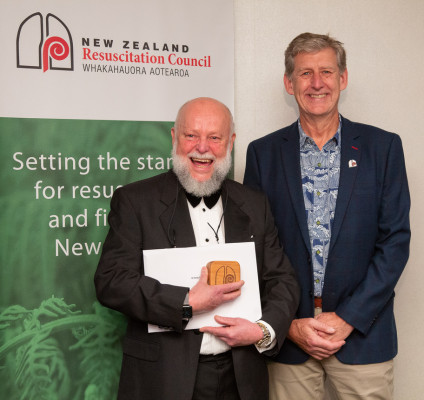About us
Our news
Meet Medical Director Dr Andy
Meet Medical Director Dr Andy
 09 June 2025
09 June 2025
Meet Medical Director Dr Andy
As one of Wellington Free Ambulance’s medical directors, Dr Andy has a unique and essential role in the ambulance services for the people of Greater Wellington and Wairarapa. He’s an advocate for paramedics and patients alike – using his voice to influence how clinical care is provided, supporting and guiding paramedics in responding to complex patient cases, and ultimately contributing to what pre-hospital patient care looks like for the people of Greater Wellington and Wairarapa. Keep reading to meet Dr Andy, learn about his role at Wellington Free and his impact on the ambulance sector over the years.

An affinity for the ambulance sector
Dr Andy is an all-rounder in the healthcare sector, wearing many hats over his 51-year career as a doctor.
Alongside his current role as Wellington Free Ambulance’s Medical Director – Education, Training and Research, he works at Wellington Hospital and as a prehospital researcher with Auckland University of Technology and Otago University.
Over his career, Dr Andy has trained and practiced as a general practitioner, a surgeon, and as an emergency department consultant across England and Aotearoa New Zealand, setting up five emergency departments single-handed.
Ultimately, it's emergency medicine and Wellington Free Ambulance where Dr Andy has had a significant impact - both in clinical care and empowering and supporting paramedics in their practice and research.
“Ambulance staff are ‘salt of the earth’. This can mean several things, but to me it means dedication, commitment, openness, thinking of others,” Dr Andy says.
The medical director ethos: Patient safety, patient benefit and asking questions
For Dr Andy, two things are vital in the role of a Medical Director: patient safety and patient benefit.
“Firstly, you want to be safe for the patient, and then you want to give them as much benefit as you can,” he explains. “Everything flows from that. If you’re working for the patient's benefit, you want to make sure that the paramedics are trained and prepared to give the best care.”
The approach Dr Andy has adopted throughout his role in supporting paramedics is a simple one – ask questions.
“My philosophy has always been, ‘is there anything I can help with guys?’ The scene is theirs. They run it. If I see something I’m uncomfortable with, I will ask a question,” he says.
“Is this the right moment to be giving that drug? Are you happy to give that drug? Should we wait a few moments? I wonder if it might be better if we do such-and-such. The wise paramedic will go, ‘ah, that’s a good idea’, and wouldn’t feel threatened. This is called crew resource management which takes you from low-level questioning until you have to say, ‘this is unsafe, stop!” Dr Andy explains.
“I’ve never had to do that.”
Finding a family within paramedicine
Dr Andy was born and raised near London and then in the New Forest, Hampshire. His first emergency consultant post was in Worcestershire, a county in the West Midlands. He had what he describes as a classical English upbringing.
The British classical composer, Elgar, had lived only a couple of hundred metres from Dr Andy’s home. Over the years, he grew to adopt a British sense of humour which still seems to put people at ease. Nestled around the ancient Malvern Hills, you’d often find Dr Andy perched on their summit on a good day, delighting in the spectacular 50-mile views and responding off road to emergencies thereabouts.
His first real interaction with ambulance services was there in 1986. “In my first week as an ED [Emergency Department] consultant at Worcester Hospital, two ambulance officers were in my doorway and said, ‘We want to ask a big favour. Will you be our medical director?’” he recalls.
“It was my first ambulance family in England, like Wellington Free Ambulance has become my ambulance family in New Zealand. I spent a significant amount of my spare time with those paramedics, running evening training sessions where they would present cases. I’d help with their assessments, give them advice and respond by road to help them with their patients.”
“They only had to call me and ask for a hand, and I would go immediately. Similarly, if I ever needed a hand (like when my Land Rover became stuck in mud), they were there just as fast,” he says.
“Teamwork has always been very high on my priority list.”
Performance under pressure
Over the years, Dr Andy has had a profound impact on many people – in England and across this side of the world.
Seeking a change in pace and scenery, he now lives in Te Whanganui-a-Tara (Wellington), working with the country’s uniquely free ambulance service since 2008.

Dr Andy has achieved extraordinary things at Wellington Free Ambulance, helping our organisation progress and develop into the modern ambulance service that exists today.
This includes playing a key role in introducing specialist paramedic practice not just to Greater Wellington and Wairarapa, but to Aotearoa New Zealand.
“We had the first flight paramedics and the first extended care paramedics in New Zealand. We also developed the first paramedic advisors and guidelines” he explains.
One moment remains forever etched in Dr Andy’s memory. A refuse truck driver was trapped between his cab and the container behind, clinging to life on one of Wellington’s streets. Dr Andy arrived on scene with a team of flight paramedics as the first responders freed the driver.
At this point, his chest had been crushed, and he went into cardiac arrest. Dr Andy knew that extreme intervention was the only hope for this patient.
“I opened the chest and could see the heart. I opened the sac where the heart sits, being careful of the nerve there, inserted my hand and squeezed the heart rhythmically,” he recalls.
He briefly removed his hand between the shocks of a defibrillator that had to be used to restart the heart. The blood pressure was too low to measure so the heart was squeezed repeatedly to sustain the man’s pulse during transport to Wellington’s emergency department.
“I remember that as we moved into the ED, there was a double-sided cordon of people standing there waiting– it was like being at a wedding! I was squeezing the heart, and thought, ‘oh no, all these people!’ It was one of those moments when you are made to feel special, but you’re not. I was just trying to help this guy,” he says.
“We gave it everything we could. Everyone was slick. I’ll remember that – not only because it was the most intense event – but because the team performed absolutely immaculately under the greatest of pressure.”
Empowering others through education
 Dr Andy was the first appointed medical director to work within Wellington Free Ambulance. The team now numbers three, all having strengths and interests in different areas of the clinical services we provide.
Dr Andy was the first appointed medical director to work within Wellington Free Ambulance. The team now numbers three, all having strengths and interests in different areas of the clinical services we provide.
While still passionate about influencing clinical care, today Dr Andy is focused on supporting the paramedic workforce through education, training and research.
“There’s a big drive with education. We’re taking on learning designs, looking at the needs of the ambulance service, and trying to design a structure that satisfies the needs of all groups,” he explains.
“It’s balancing the needs of face-to-face training, with alternatives like online training, webinars, and podcast recordings.”
“The most worthwhile sessions we’ve had with intensive care paramedics (ICPs) and critical care paramedics (CCPs), arise when we say, ‘okay guys, bring an interesting or difficult case and tell your peers all about it’. The discussion that comes out of that – under the supervision of the medical directors – is just wonderful.”
“I want to create learning systems that work” says Andy.
As someone who refers to ambulance officers as ‘salt of the earth’, there's no doubt that the Wellington Free Ambulance team feels privileged to receive the same commitment and dedication from Andy.